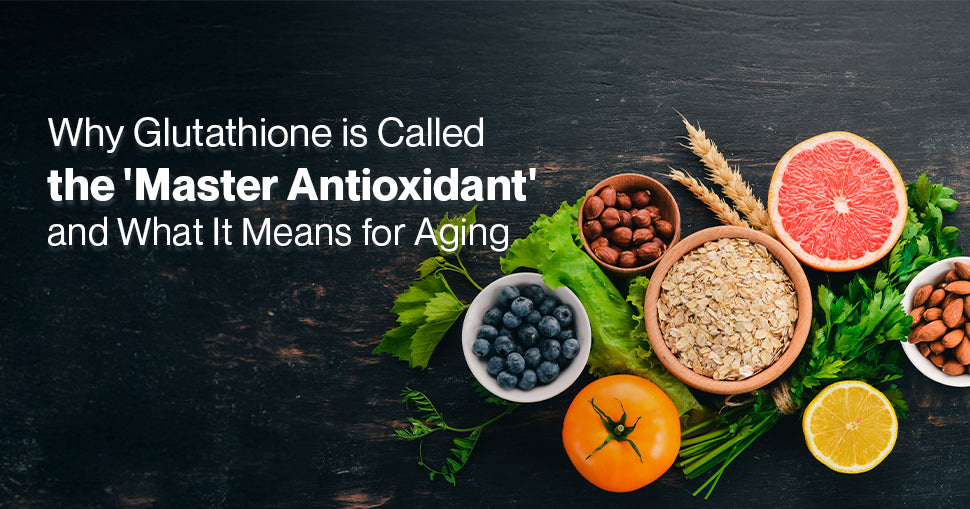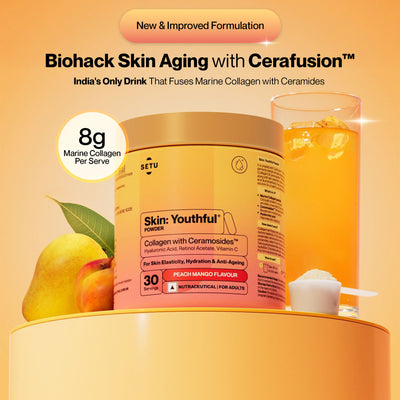Why Glutathione is Called the 'Master Antioxidant' and What It Means for Aging
17 Jan 2025
When it comes to antioxidants, one name stands above the rest: glutathione. Often referred to as the "master antioxidant," glutathione plays a pivotal role in maintaining optimal health and combating the aging process. But what makes this so unique? How does glutathione work to protect our bodies, and what does scientific evidence say about its benefits? Let’s dive deep into the science behind this powerful antioxidant and understand why it’s garnering so much attention in the realm of health and longevity.
What is Glutathione?
Glutathione is a tripeptide, a small protein molecule composed of three amino acids: glutamine, cysteine, and glycine. Found in every cell of the body, it is particularly abundant in the liver, where it plays a central role in detoxification. Unlike most antioxidants that we obtain from our diet, glutathione is unique because our body can produce it naturally.
This endogenous production makes glutathione a critical line of defense against oxidative stress, a harmful condition caused by an imbalance between free radicals and antioxidants in the body. Oxidative stress is a key contributor to aging and various chronic diseases, including cancer, diabetes, and neurodegenerative disorders.
Why is Glutathione Called the 'Master Antioxidant'?
Glutathione earns its title as the master antioxidant due to its ability to regenerate other antioxidants and maintain cellular health. It not only neutralizes free radicals but also recycles other antioxidants like vitamin C and vitamin E, restoring their active forms and extending their protective capabilities. This unique ability to enhance the efficacy of other antioxidants underscores its central role in maintaining the body's antioxidant defense system.
Additionally, glutathione is vital for:
-
Detoxification: It binds to toxins, heavy metals, and other harmful compounds, making them water-soluble so they can be excreted from the body.
-
Immune Support: It strengthens the immune system by enhancing the function of white blood cells and supporting the production of cytokines, essential for fighting infections.
-
Cellular Repair: Glutathione helps repair damaged DNA and proteins, promoting cellular longevity and reducing the risk of mutations that can lead to cancer.
How Glutathione Works
Glutathione's primary mode of action is as a reducing agent, meaning it donates electrons to unstable molecules—free radicals—to neutralize them. This process prevents free radicals from causing cellular damage, which is a major driver of aging and disease.
The Role of Glutathione in Aging
Aging is a complex process influenced by genetic, environmental, and lifestyle factors. At its core, aging involves the accumulation of cellular damage over time. Oxidative stress, inflammation, and a decline in mitochondrial function are major contributors to this process. Glutathione’s ability to combat these factors makes it a key player in anti-aging science.
Reducing Oxidative Stress
As we age, our natural production of glutathione declines, leading to increased oxidative stress. This imbalance damages cellular structures, including DNA, proteins, and lipids, accelerating aging and increasing susceptibility to chronic diseases. Supplementing with glutathione or boosting its levels through diet and lifestyle interventions can help mitigate these effects.
Supporting Mitochondrial Health
Mitochondria are the energy powerhouses of our cells, but they are also a significant source of free radicals. Glutathione protects mitochondria from oxidative damage, ensuring they function efficiently. Healthy mitochondria are essential for maintaining energy levels, cognitive function, and overall vitality as we age.
Promoting Skin Health
One of the visible signs of aging is the appearance of wrinkles, age spots, and uneven skin tone. Glutathione’s antioxidant properties help protect the skin from UV damage, pollution, and other environmental stressors. Additionally, it has been shown to lighten skin by inhibiting melanin production, making it a popular ingredient in skincare products.
Scientific Evidence Behind Glutathione Benefits
The benefits of glutathione are well-documented in scientific literature. Here are some key findings:
1. Detoxification and Liver Health
Studies have shown that glutathione plays a critical role in liver function. A 2017 review in the journal Nutrients highlighted glutathione’s effectiveness in treating liver diseases, including alcoholic and non-alcoholic fatty liver disease. By neutralizing toxins and reducing inflammation, glutathione supports liver health and overall detoxification.
2. Immune Function
Research published in Molecular Immunology (2011) demonstrated that glutathione enhances immune response by improving T-cell function, which is crucial for fighting infections and cancer. Individuals with low glutathione levels are more susceptible to illnesses, emphasizing its importance in maintaining immune resilience.
3. Anti-Aging Effects
In a 2020 study published in Clinical Interventions in Aging, researchers observed that glutathione supplementation improved markers of oxidative stress and inflammation in older adults, leading to better overall health and vitality.
4. Skin Benefits
A randomized controlled trial published in Dermatology Practical & Conceptual (2017) showed that oral glutathione supplementation significantly reduced melanin production and improved skin elasticity, making it a promising option for anti-aging skincare.
How to Boost Glutathione Levels
Maintaining optimal glutathione levels is crucial for reaping its benefits. Here are some ways to enhance glutathione production:
1. Diet
-
Sulfur-rich foods: Garlic, onions, broccoli, kale, and cauliflower are excellent sources of sulfur, a key component of glutathione.
-
Antioxidant-rich foods: Blueberries, spinach, and other colorful fruits and vegetables support overall antioxidant activity.
-
Protein sources: Eggs, fish, and lean meats provide the amino acids needed for glutathione synthesis.
2. Supplements
-
N-acetylcysteine (NAC): This precursor to glutathione has been shown to effectively boost its levels.
-
Liposomal glutathione: This form of glutathione is more bioavailable and easily absorbed by the body.
-
Vitamin C and E: These antioxidants help regenerate and preserve glutathione.
3. Lifestyle Changes
-
Exercise: Regular physical activity has been shown to increase glutathione levels and improve antioxidant defenses.
-
Stress management: Chronic stress depletes glutathione, so practices like meditation and yoga can help maintain its levels.
-
Avoid toxins: Reducing exposure to pollutants, alcohol, and processed foods can preserve glutathione stores.
Conclusion
Glutathione’s role as the "master antioxidant" is well-deserved. Its ability to combat oxidative stress, support detoxification, and enhance cellular health makes it a cornerstone of anti-aging strategies. As scientific evidence continues to unveil its wide-ranging benefits, glutathione stands out as a key player in promoting longevity and vitality. Whether through diet, supplementation like Setu Skin: Renew, or lifestyle adjustments, boosting your glutathione levels could be a game-changer in your journey to healthy aging.
Skin: Renew - Glutathione - Orange Flavour
- ₹1,996
- ₹1,996
-
₹2,600 - ( 23% OFF)
Categories
- Choosing a selection results in a full page refresh.
- Press the space key then arrow keys to make a selection.
this is the sidecart
















